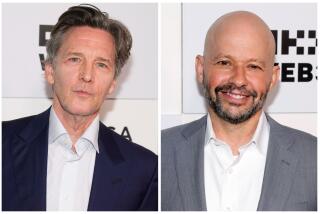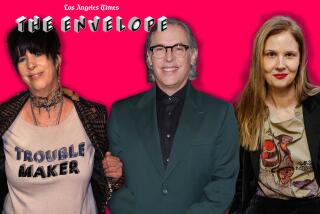Revisiting the Clan in HBO’s ‘Rat Pack’
- Share via
Hollywood, like America, was on a Sinatra binge when the singer died Thursday night. Where bobby-soxers fueled the first wave 50-odd years ago, smitten with a toothpick-thin, big-band singer with a velvet voice, the current wave came from baby boomers and Generation X and Y, who were caught up in the nostalgia and coolness of Vegas, martinis, cigarettes, the Rat Pack and the allure of all things politically incorrect.
Frankie-baby was the undisputed king of the pack.
HBO recently wrapped its big-budget paean, “The Rat Pack,” tentatively scheduled for a late-summer airing, with Ray Liotta all suavity and dangerous charm as Sinatra in the late ‘50s, when the Rat Pack was in full swing. He’s joined by Don Cheadle as Sammy Davis Jr., Angus MacFadyen as Peter Lawford and Joe Mantegna as Dean Martin.
The made-for-cable movie, written by Kario Salem, is no frothy romp, but rather a serious stab at historical placement of Sinatra and his cronies. The men and the era are positioned as cultural markers of the new era of synergy between Washington and Hollywood, and the Rat Pack power wanes with the assassination of John F. Kennedy.
Warner Bros. also has been developing a remake of the best of the Rat Pack feature ensembles, “Ocean’s Eleven,” in which the gang of merry pranksters plans a heist of Vegas casinos. In real life, Sinatra and the men shot the film by day, in mid-1960, and partied and performed at night on the Strip.
Filmmaker Martin Scorsese, also fascinated with Rat Pack cool, is developing a big-screen biography of Dean Martin with noted screenwriter Nicholas Pileggi.
And it’s not only Scorsese who’s turned on to the Clan, as they called themselves. The A-list talent who share Rat Pack fervor are Tom Hanks, who reportedly wants to play Martin, John Travolta to play Sinatra, Hugh Grant as Peter Lawford and Jim Carrey as Jerry Lewis.
Two weeks ago, the cable channel TV Land, with much advance fanfare, broadcast for the first time nationally the famous St. Louis Rat Pack concert taped in 1965. The showing garnered the highest ratings to date for the new cable service, which is planning another airing of the black-and-white show.
Though the HBO “Rat Pack” film had been the subject of much press about the opposition by Sinatra’s family, notably daughter Tina Sinatra, there reportedly had been a slowing easing of tension, as some members of the family sensed that the film was not out to trash Sinatra.
“I understand a daughter’s fierce protectiveness and a feeling of helplessness,” “Rat Pack” director Rob Cohen said a few weeks ago on the set of the film, shot on vintage locations in and around Los Angeles. “But I love Frank Sinatra not because he’s perfect, but because his imperfections make him all the more great. Ultimately it’s a very positive portrayal. And I feel what we ultimately arrive at will surprise them.”
Another signal that Sinatra himself might have warmed to the film biography was that Liotta, who stars as Sinatra, was invited as a guest to a Sinatra-sponsored charity tournament in Las Vegas at the end of May, as well as to next week’s previously scheduled Sons of Italy Foundation event in Washington, at which Barbara Sinatra was to accept a humanitarian award for her husband.
“I knew the Sinatra family were not against me personally, since they had offered me the miniseries [produced for CBS by Tina Sinatra in 1992],” explained Liotta between takes of the film, dressed as cool-cat Sinatra in late-’50s narrow sharkskin slacks. “I had known there was more than the singer, more than an edgy, angry guy, and rightfully so. I wanted to get the sensitive human side.”
The actor said that lip-syncing to the man many call the greatest pop singer of the century was the greatest high of his career. Says Liotta: “It was, as they say here, a gas.”
Writer Salem was also cognizant of family concerns. The script was written without either approval or consultation with the family, but based on voluminous research by the recent Peabody winner for HBO’s movie “Don King: Only in America.” “I know it’s a frightening, threatening thing having your father interpreted, without your participation, for public consumption but I can assure her it’s not a hatchet job,” says Salem.
“I didn’t see beyond the bourbon and bad jokes,” is how the writer came into the project. Now, he says, “I have enormous regard for the characters, their flaws and strengths intact, people full of paradoxes and contradictions. There are aspects of Frank’s character which are troubling, but there are also aspects that are noble.”
The script also reflects his perception of Sinatra as a “much more astute political thinker than people realized, and much more than just a saloon singer.”
“The Rat Pack” isn’t the last biography of Sinatra, who was the fulcrum of the group, and the period in which they flourished. But it’s the first that signals a new assessment, and respect, for their impact on the culture.
“It was this peculiar time when things came together, and Frank was at the center. And that linkage has not broken--big politics, big media, big Hollywood, big organized crime. That linkage came through Frank Sinatra. He was the crossroads in which all these elements met,” says director Cohen, who a few weeks ago, when the film wrapped, predicted that Sinatra would ‘actually like” the film.
“He will see that we’ve been accurate in the things that are controversial and the things to be celebrated,” says the director. “It’s the celebratory aspects that are dominant. The film is aware. And the thing about Sinatra is that he’s a man who has always responded to truth, who liked to say, ‘Be aware.’ ”
More to Read
The complete guide to home viewing
Get Screen Gab for everything about the TV shows and streaming movies everyone’s talking about.
You may occasionally receive promotional content from the Los Angeles Times.






